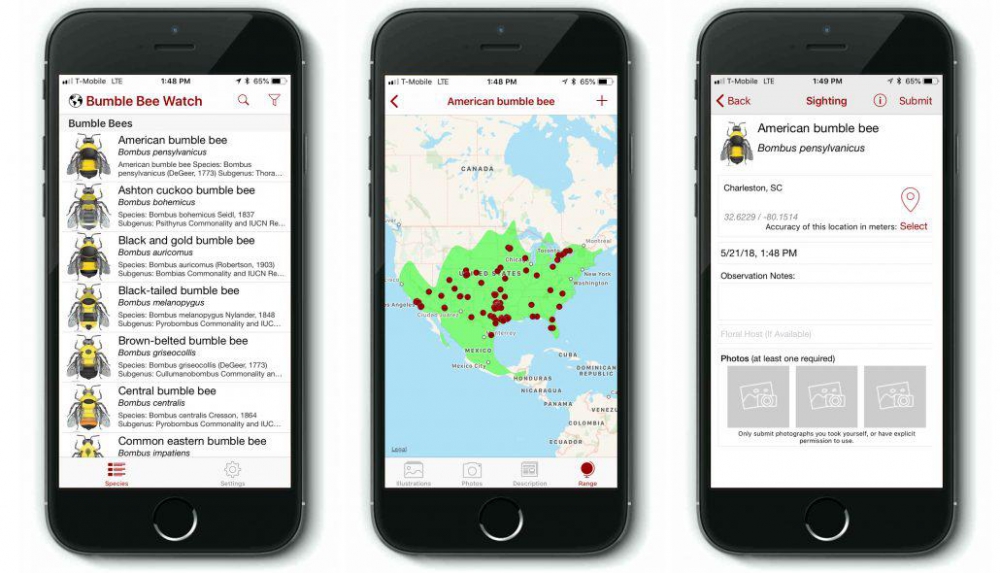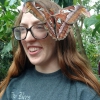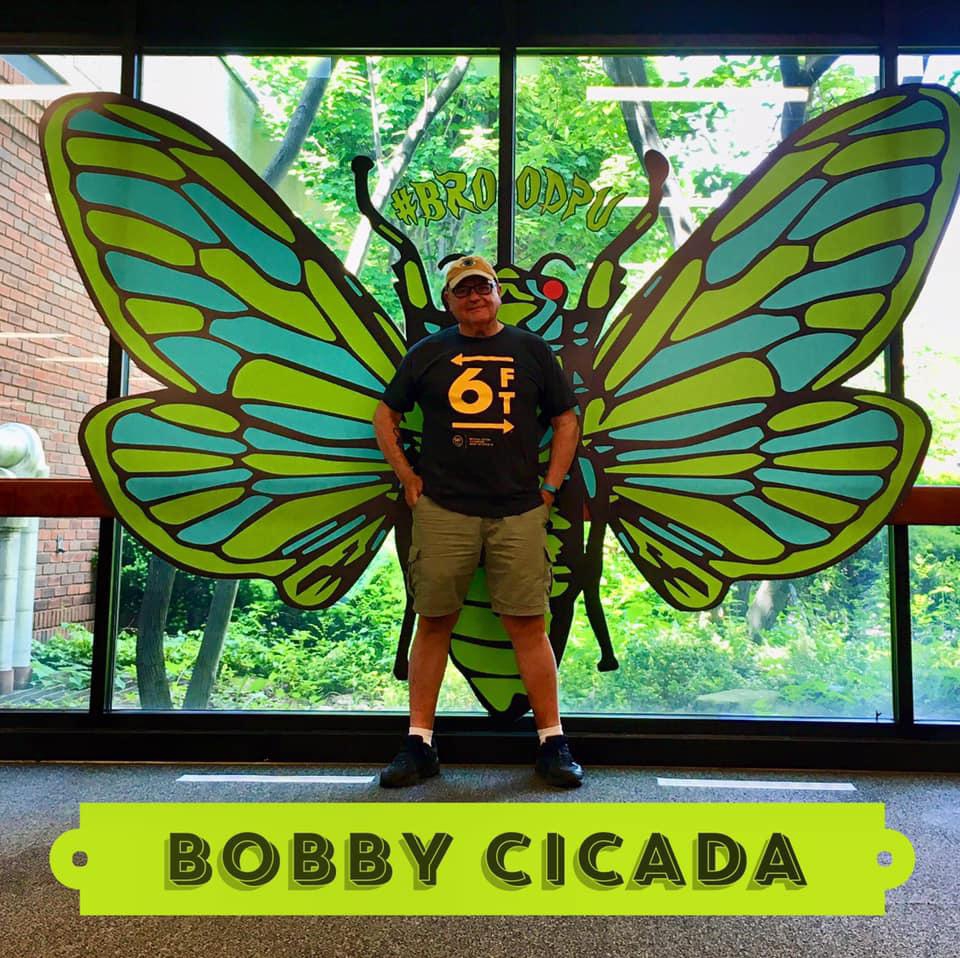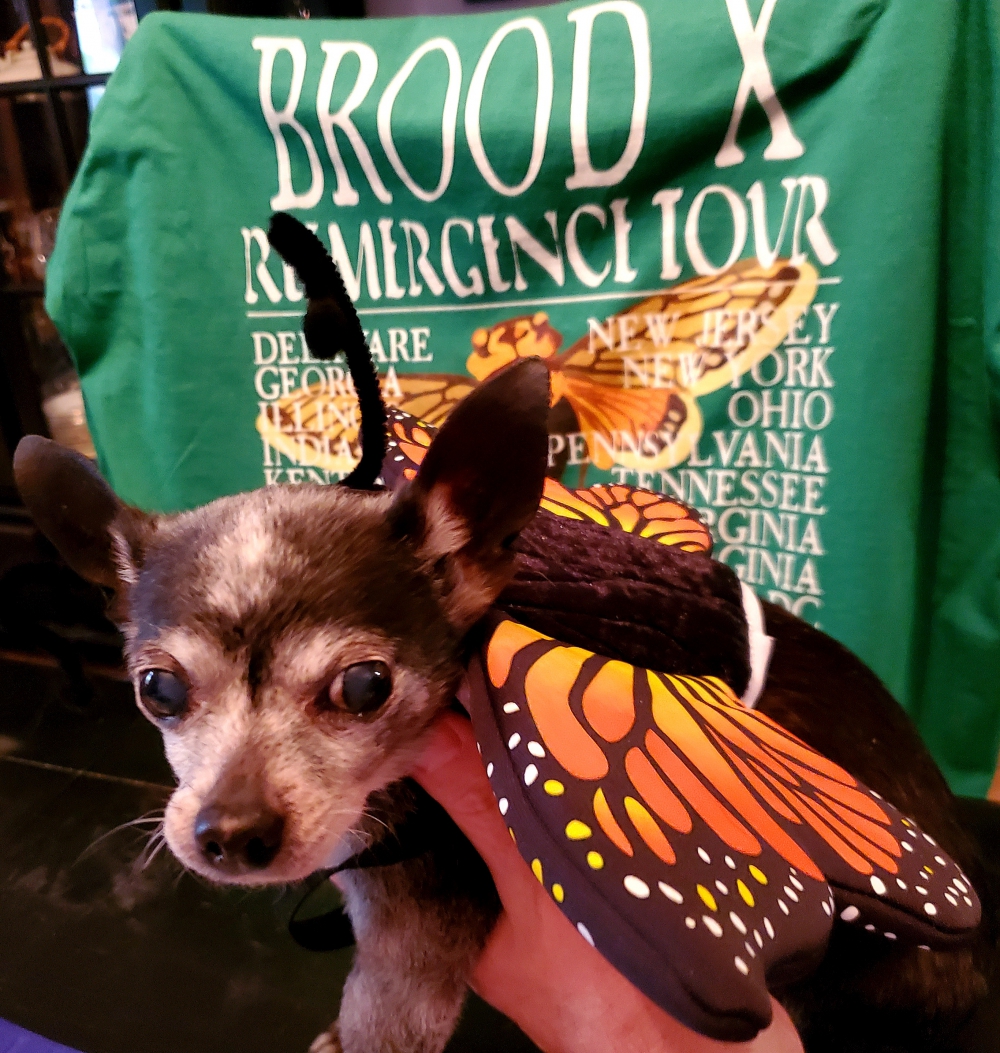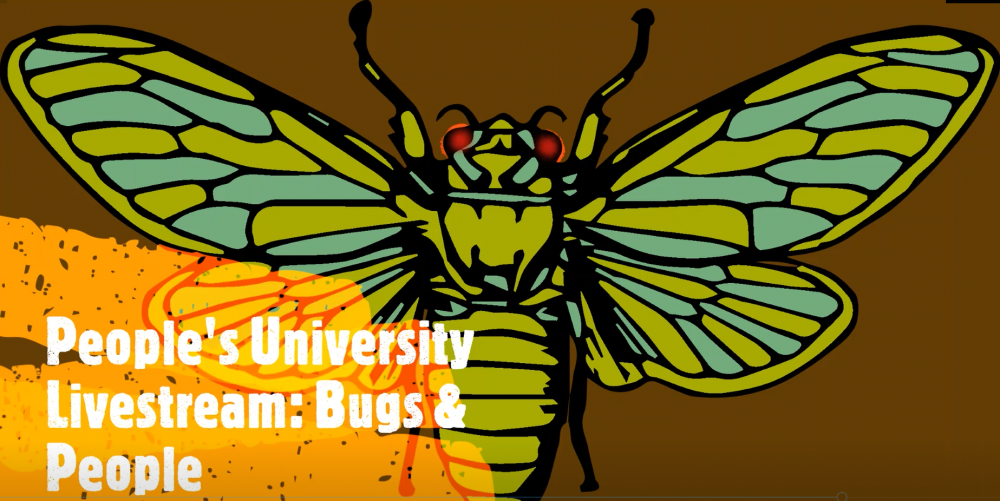
People University Livestream: Series 32 - Bugs and People
What do cicadas and people have in common? Both are re-emerging and re-uniting this summer.
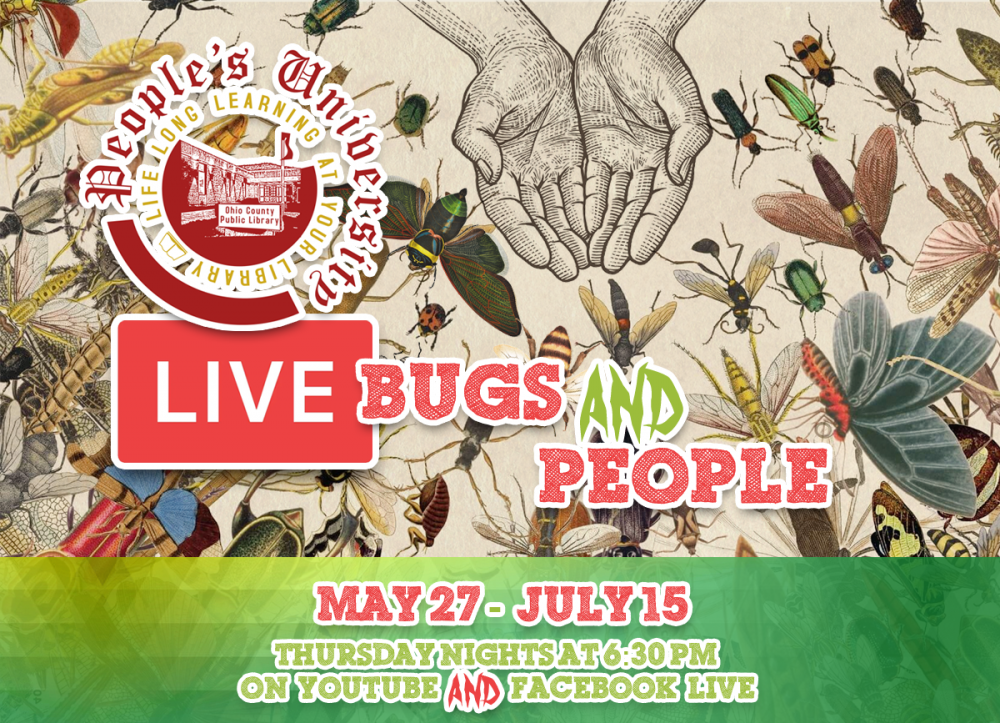 Inspired by the return of Brood X or the Great Eastern Brood of periodical cicadas, the People's University at the Ohio County Public Library will offer an 8-class summer series on entomology (insect biology) called "PU Livestream: Bugs & People." The series will feature some of the best entomologists and experts from all over North America to teach attendees about the six major insect orders, as well as the history of human and insect interaction, a subject known as cultural entomology.
Inspired by the return of Brood X or the Great Eastern Brood of periodical cicadas, the People's University at the Ohio County Public Library will offer an 8-class summer series on entomology (insect biology) called "PU Livestream: Bugs & People." The series will feature some of the best entomologists and experts from all over North America to teach attendees about the six major insect orders, as well as the history of human and insect interaction, a subject known as cultural entomology.
Due to ongoing COVID-19 restrictions still affecting in-person library gatherings, the series will remain an online livestream, which facilitates the nationwide, prestigious faculty.
Participants will have the opportunity to learn about insects while becoming eligible to win various insect-related prizes through interaction with the instructors.
View the class broadcasts below.
People's University Livestream Bugs and People - Summer 2021 - Thursdays at 6:30 pm
Class descriptions and faculty biographies are listed below. Recordings of classes that have already broadcast can also be viewed below.
Week 1 - May 27, 2021:
|
|
CLASS 1 — May 27 at 6:30 pm:
|
|
Week 2 - June 3, 2021:
|
|
CLASS 2 — June 3 at 6:30 pm:
|
|
Help track BroodX with Dr. Kritsky's Cicada Safari App!
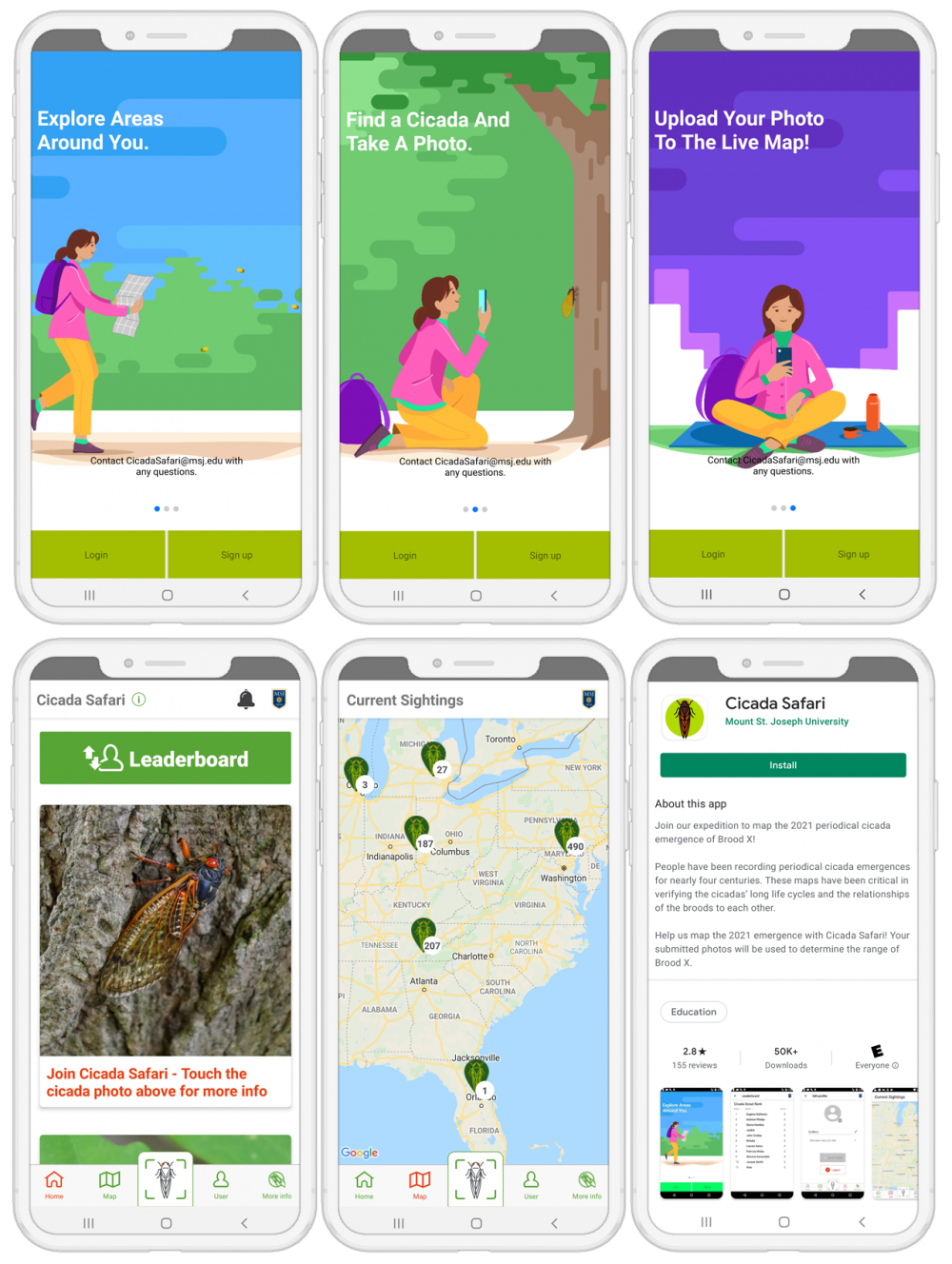 Join Cicada Safari to help map the 2021 emergence of the periodical cicada Brood X. Simply download the free app from the Apple App Store or Google Play, then go on a safari to find periodical cicadas. Photograph and submit the periodical cicadas to Cicada Safari, and after the photos are verified, they will be posted to the live map. Cicada Safari was created by Dr. Gene Kritsky working with the Center for IT Engagement at Mount St. Joseph University in Cincinnati.
Join Cicada Safari to help map the 2021 emergence of the periodical cicada Brood X. Simply download the free app from the Apple App Store or Google Play, then go on a safari to find periodical cicadas. Photograph and submit the periodical cicadas to Cicada Safari, and after the photos are verified, they will be posted to the live map. Cicada Safari was created by Dr. Gene Kritsky working with the Center for IT Engagement at Mount St. Joseph University in Cincinnati.
A small colony of Brood X cicadas has been reported in the Wheeling area as far back as 1919. Help us locate an emergence this year and help put Wheeling on the 2021 map.
Learn more on the Cicada Safari website at cicadasafari.org.
Week 3 - June 10, 2021:
|
|
CLASS 3 — June 10 at 6:30 pm:
|
|
Week 4 - June 17, 2021:
|
|
CLASS 4 — June 17 at 6:30 pm:
|
|
Help the DNR track Lightning Bugs in WV!
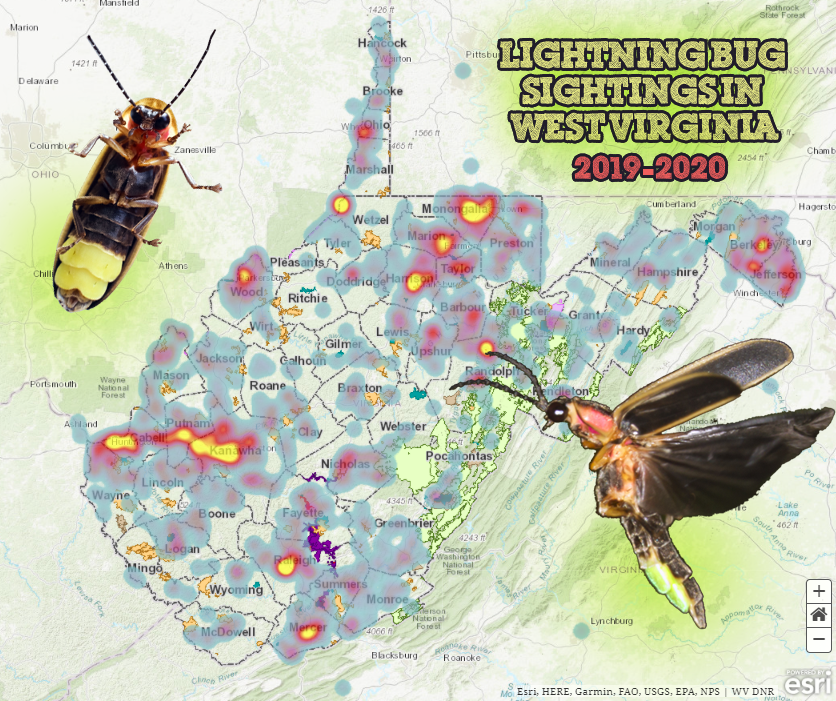 In an effort to understand declining lightning bug populations, the West Virginia Division of Natural Resources is inviting the public to participate in a citizen science project to track sightings of them in the state. West Virginia has up to 40 species of lightning bugs that may have declined in number because of habitat loss, pesticide use, and other environmental causes, such as light pollution, but can still be seen in fields and forests after sunset during the summer.
In an effort to understand declining lightning bug populations, the West Virginia Division of Natural Resources is inviting the public to participate in a citizen science project to track sightings of them in the state. West Virginia has up to 40 species of lightning bugs that may have declined in number because of habitat loss, pesticide use, and other environmental causes, such as light pollution, but can still be seen in fields and forests after sunset during the summer.
West Virginia residents can be part of the conservation efforts and participate in the survey of lightning bugs by going outside, looking for lightning bugs, and reporting the location of the sightings online. Using the hashtag #lightupwestvirginia or #lightupWV you can also share photos and basic info and it may be included on the WVDNR Facebook page to celebrate World Firefly Day on July 3-4, an annual event in July.
Learn more at Light Up West Virginia: A citizen science survey of lightning bugs, fireflies, and glow-worms.
Week 5 - June 24, 2021:
|
|
CLASS 5 — June 24 at 6:30 pm:
|
|
Help track bumble bees across North America!
North American bumble bees need your help! Because these animals are widely distributed the best way to keep track of them is with a group of volunteers across the country equipped with cameras. With any luck, you might help find remnant populations of rare species before they go extinct. Participating in Bumble Bee Watch is simple and you can get started now by creating an account via the “sign in” tab at the top of the page or by downloading the phone app (Apple Store download or Google Play download). Once you have an account, go out and check your garden, in parks, or any other natural areas you frequent for bumble bees. Be sure to snap a photo (learn more about how to photograph bees here) and then sign in and submit your data via our Bumble Bee Sightings form. Have fun while learning more about bumble bees and the vital role they play in our environment!
Other ways you can help:
- Create habitat! You can find more information about how to create bumble bee habitat at www.xerces.org/bumblebees.
- Support local and organic agriculture. Many pesticides are harmful to bumblebee colonies and many vegetable and fruit plants provide great food sources for bees.
- Spread the word! Many people are afraid of bumble bees and other insects. Let your friends and family know how important they are and encourage them to take photos too!
Week 6 - July 1, 2021:
|
|
CLASS 6 — July 1 at 6:30 pm:
|
|
Help track disease-carrying mosquitoes with crowd-sourced acoustic surveillance!
Mosquitoes can be deadly, transmitting malaria, dengue, and Zika. But tracking them is tough. Now, researchers—led by bioengineer Manu Prakash of Stanford University in Palo Alto, California—have developed a new, cheap way to monitor these insects with mobile phones and a Shazam-like app that tells them apart based on their “songs.” Most mosquito species can be identified by the frequency of their wingbeats, so the web app—aptly named Abuzz—lets users upload recordings of mosquito sounds, identify the species, and map its location. But getting a good recording can be tricky: The insect cannot be more than 10 centimeters away from the microphone, and background noise cannot be louder than light traffic. Learn more on Standford's Abuzz webpage.
Lunch With Books Special! - July 6, 2021:
|
|
Lunch With Books — July 6 at noon:
|
Presenter Bio: OCPL staff member Nayt Knapp is an insect enthusiast. Specifically, he is a big fan of the order Mantodea, better known as Mantises. The order features more than 2,400 species living all over the globe in temperate zones. In this conversation, Nayt will address questions about mantises, including: How long do they live? What do they eat? What's sexual cannibalism? Can they fly? Are they dangerous to humans? How smart are they? Do they make good pets? Is it illegal to kill one? Nayt will also tell us all about the exciting new Mantis-CAM and Vivarium exhibit at the library. |
PREVIEW OUR MANTIS-CAM AND VIVARIUM!
We now have two female Chinese Mantis nymphs living in our habitats at the library. One is brown and one is green. You can watch them grow online! Our Mantis-CAM and vivarium will be on display inside the main entrance of the Library starting the week of July 6. In the meantime, you can watch our baby mantises preparing to molt from the safety of our office prior to the move into a fully functioning vivarium in a public setting where Library guests and patrons can come and see our growing mantises in person during regular library hours. The Mantis-CAM will live stream 24-hours a day allowing anybody anywhere to check in on our mantises anytime!
What you are viewing above is a live stream feed of one of our baby mantises. You might not see too much movement immediately, but if you have patience and wait a bit, you might notice a fruit fly flicker by, or our mantis expanding and contracting its abdomen, or even doing a little dance. You might even be lucky enough to catch our mantis feeding (that's what the fruit flies are for) or molting—how cool is that! Check in often and watch our mantises grow with us, then stop by the Library starting July 6 to see them in person.
— View our Mantis-CAM anytime at https://www.ohiocountylibrary.org/programs/ocpl-mantis-cam/7484.
Our mantises need names! That's where you come in. Use this FORM to send us your name nominations.
On July 15 at our final PU Livestream Bugs & People, we will choose the winners! In addition to the honor of naming the first two OCPL Mantis-Cam Mantises, the winners will receive a fabulous Mantis-Themed gift and a gift certificate to a local restaurant!
Week 7 - July 8, 2021:
|
|
CLASS 7 — July 8 at 6:30 pm:
|
|
Help track the migration of monarch butterflies!
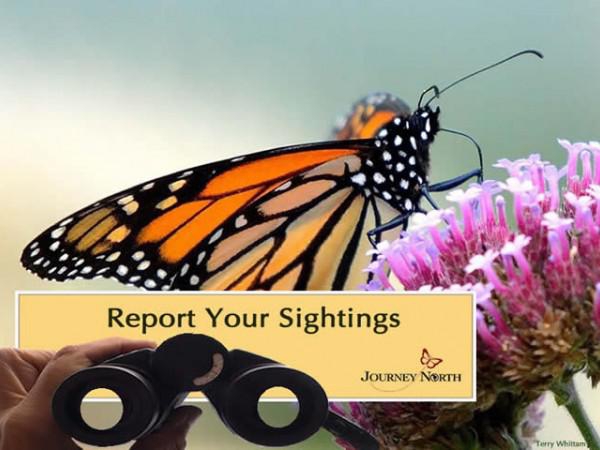 In its 25th year, Journey North is one of North America’s premiere citizen science programs for people of all ages. The project has broad participation, with over 60,000 registered sites in the US, Canada, and Mexico — including families, teachers, schools, nature centers, professional scientists, and novices. Journey North provides an easy entry point to citizen science, with simple protocols, strong online support, and immediate results. Reported sightings are mapped in real-time as waves of migrations move across the continent. People report sightings from the field, view maps, take pictures, and leave comments.
In its 25th year, Journey North is one of North America’s premiere citizen science programs for people of all ages. The project has broad participation, with over 60,000 registered sites in the US, Canada, and Mexico — including families, teachers, schools, nature centers, professional scientists, and novices. Journey North provides an easy entry point to citizen science, with simple protocols, strong online support, and immediate results. Reported sightings are mapped in real-time as waves of migrations move across the continent. People report sightings from the field, view maps, take pictures, and leave comments.
Create an account with Journey North to report your monarch butterfly sightings at https://journeynorth.org/sightings/.
Week 8 - July 15, 2021:
|
|
CLASS 8 — July 15 at 6:30 pm:
|
|
See full Instructor Bios and Class Abstracts, visit: www.facebook.com/peoplesuniversityOCPL. Click on “Events.”
WIN PRIZES JUST BY TUNING IN OR SHARING A PHOTO!
As part of our People's U Livestream: Bugs & People summer series, the Library has commissioned Wheeling artist Bob Villamagna—the WV Tinman—to make a work of art based on the re-emergence of the Brood X or Great Eastern Brood of periodical cicadas, which are starting to re-emerge this summer. Villamagna, name the 2016 West Virginia Artist of the Year, is a popular mixed-media artist who uses repurposed lithographed metals, found objects, and vintage photographs to create colorful and whimsical pieces. People's University viewers and supporters will have the chance to be entered into a drawing to win Bob's artwork or other prizes, such as #BroodPU tee shirts, tote bags, or coffee mugs, gift certificates to local restaurants, or insect-related books.
THREE WAYS TO WIN:
Cicada Yourself For the Villamagna Artwork and Other PrizesIn light of the long quarantine from which we are just starting to emerge thanks to vaccines, we thought the periodical cicadas' epic journey made a nice metaphor for what we humans are all experiencing. The time has come to emerge from your home, find your wings, and fly! Starting now and running through and including July 15, anyone can come to the library, find the giant 8-foot cicada wings, take a photo or ask library staff to take one in front of the wings, post it with the hashtag "BroodPU," or tag the Ohio County Public Library, OR, email the photo directly to the library for posting, and be entered into our drawing to win the Bob V. artwork and other prizes. |
Bug Your Pug or Gnat Your Cat!You can become eligible to win #BroodPU tee shirts, tote bags, or coffee mugs, gift certificates to local restaurants, or insect-related books -- plus pet treats! -- by dressing your pet like an insect, taking a photo, posting it, and tagging the Ohio County Public Library, OR, emailing the photo directly to the library for posting. Library staff will choose their favorites and contact the winners to send out the prizes! |
Tune in to our Live BroadcastsAsk a topic-relevant question to one of our presenters during one of our live broadcast to be entered into a drawing for BROODPU merch. Win a t-shirt, canvas book bag, coffee mug, cicada pin, and more! |
- People's University Online-
|
Also, make sure to check back in the weeks to come for information on a field trip to be scheduled the week after our last class.
Library staff member Nayt Knapp, a praying mantis breeder, will lead us on a field trip where we can use our new-found knowledge to identify local insects.
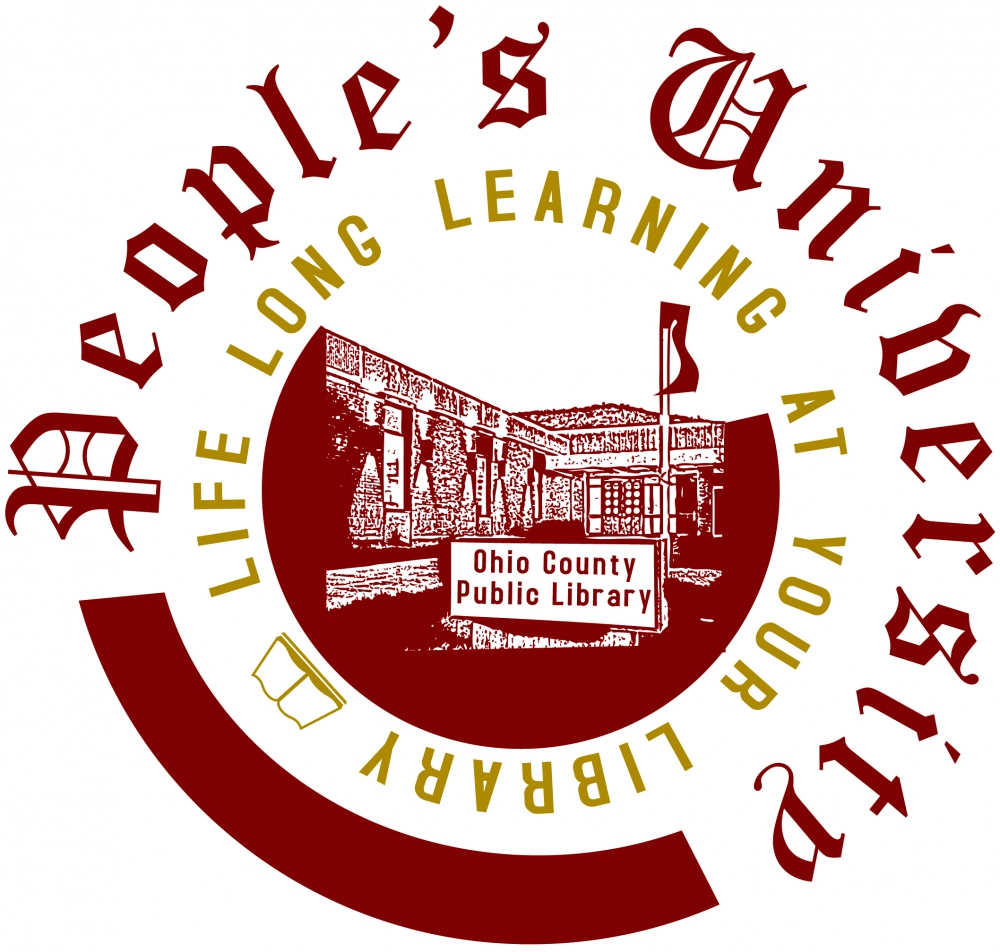 What is the People's University?
What is the People's University?
 In 1951, the Ohio County Public Library's head librarian, Virginia Ebeling, referenced British historian Thomas Carlyle, who said, “the public library is a People’s University,” when she initiated a new adult education program with that name. Miss Ebeling charged the Library with the responsibility of reaching “as many people in the community as possible.” In keeping with that tradition of public libraries as sanctuaries of free learning for all people, the Ohio County Public Library revived the series in 2010.
In 1951, the Ohio County Public Library's head librarian, Virginia Ebeling, referenced British historian Thomas Carlyle, who said, “the public library is a People’s University,” when she initiated a new adult education program with that name. Miss Ebeling charged the Library with the responsibility of reaching “as many people in the community as possible.” In keeping with that tradition of public libraries as sanctuaries of free learning for all people, the Ohio County Public Library revived the series in 2010.
 The People’s University is a free program for adults who wish to continue their education in the liberal arts. It features courses—taught by experts in each subject—that enable patrons to pursue their goal of lifelong learning in classic subjects such as history, philosophy, and science. Patrons may attend as many classes as they wish. There are no tests of other requirements and all programs are free and open to the public. For more information about PU Livestream, Bugs & People, EMAIL US, visit ohiocountylibrary.org or call the library at 304-232-0244.
The People’s University is a free program for adults who wish to continue their education in the liberal arts. It features courses—taught by experts in each subject—that enable patrons to pursue their goal of lifelong learning in classic subjects such as history, philosophy, and science. Patrons may attend as many classes as they wish. There are no tests of other requirements and all programs are free and open to the public. For more information about PU Livestream, Bugs & People, EMAIL US, visit ohiocountylibrary.org or call the library at 304-232-0244.









 Want to keep up with all the latest Library news and events?
Want to keep up with all the latest Library news and events? 



